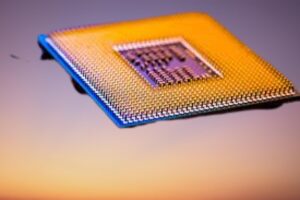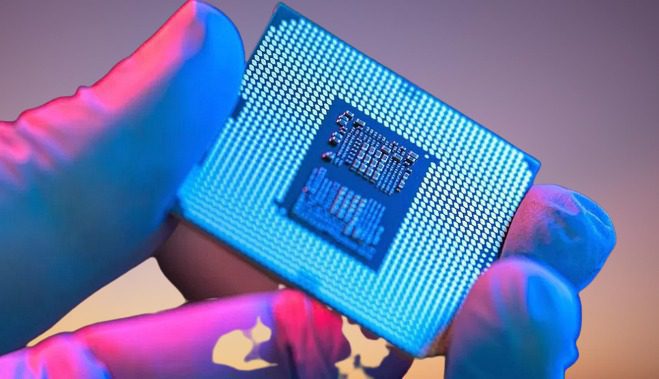Dutch Government Restricts Chip Equipment: The Dutch government has recently announced new rules aimed at restricting the export of specific advanced semiconductor equipment. This decision comes in response to increasing pressure from the United States, urging its allies to curtail the sale of high-tech components to China. The move is motivated by concerns over national security, as certain equipment in question may have potential military applications. While the restrictions will impact a limited number of companies and product models, China has not been explicitly named in the announcement.
ASML’s Response and Financial Guidance
ASML, a prominent Dutch company that serves as a key equipment supplier to computer chip manufacturers, has responded to the new regulations. Despite the restrictions, ASML has confirmed that it will not be altering its financial guidance as a result of the implemented rules. This indicates the company’s confidence in maintaining its projected financial forecasts.
The newly announced regulations will require manufacturers of advanced chipmaking equipment to obtain a license before they can export their products. These ASML’s Response and Financial Guidance requirements are expected to go into effect on September 1. To provide clarity on which specific equipment will necessitate a license, a technical document accompanying the announcement has been made available.
Global Impact of Dutch Government
The introduction of this list of restricted equipment is a result of a high-level agreement between the United States and two of its allies, the Netherlands and Japan. The objective of this agreement is to tighten Global Impact of Dutch Government restrictions on China’s ability to develop and manufacture its own chips. ASML, as Europe’s largest technology company, has already outlined which models from its second most advanced “DUV” product line will require an export license. Notably, ASML’s most advanced EUV machines have never been exported to China.
Stock Market Response and Industry Implications
Following the news of the Dutch government’s restrictions, ASML’s shares experienced a decline of 3.6%. Additionally, ASM International, a smaller rival to ASML, saw a decrease in its stock value by 1.8%. These Stock Market Response and Industry Implications reactions highlight the potential impact of the regulations on the affected Stock Market Response and Industry Implications companies and the wider chip equipment industry.
U.S. Export Restrictions and China’s Response
The U.S. had previously imposed export restrictions on chipmaking tools shipped to China from American companies such as Lam Research and Applied Materials.


Also Read: The Miraculous Return of Rudy Farias
These measures were enacted on the basis of national security concerns. The U.S. has also been actively encouraging other countries with significant chip equipment suppliers to implement similar restrictions. China, in turn, has criticized these actions, contributing to escalating tensions between the two nations.
Additional Rules of Dutch Government
Reports suggest that the United States may introduce further regulations next month, further complicating the landscape for chip equipment exports. The Additional Rules of Dutch Government evolving situation will require companies and governments to closely monitor and adapt to these changing circumstances.
Anticipated License Applications and Impact on Companies
Trade Minister Liesje Schreinemacher expects approximately 20 license applications on an annual basis. It is important to note that this number represents only a small portion of the product portfolios of companies affected by the new rules. This Anticipated License Applications and Impact on Companies limited impact provides Anticipated License Applications and Impact on Companies some reassurance to the industry and suggests that the regulations will not have a significant disruptive effect.
Wassenaar Arrangement and EU Cooperation
ASML has previously been subject to restrictions on selling EUV machines without a license under the Wassenaar Arrangement, an international agreement. The newly implemented Dutch rules further clarify that EUV machines fall under these restrictions. While other European Union countries generally align with the Wassenaar Arrangement to determine their own export restrictions, it remains uncertain whether the new Dutch list will be adopted by other European nations or incorporated into the EU’s own list. However, Wassenaar Arrangement and EU Cooperation should be noted that only a few European countries export high-end chipmaking equipment. German Manufacturers and Supply Chain Implications Critical components for ASML’s equipment, including lasers from Trump and lenses from Zeiss, are supplied by German manufacturers. The
German Manufacturers and Supply Chain Implications
German Manufacturers and Supply Chain implementation of the Dutch regulations may indirectly impact these suppliers, potentially influencing the wider global supply chain.
Conclusion of Dutch Government Restricts Chip Equipment
The Dutch government’s decision to restrict the export of advanced semiconductor equipment reflects the increasing pressure exerted by the United States on its allies to limit sales of high-tech components to China. While the regulations will affect a limited number of companies and product models, their implementation underscores the importance of national security considerations. Conclusion of Dutch Government Restricts Chip Equipment, ASML, as a major player in the industry, has responded with confidence and confirmed that it does not expect a significant financial impact. The impact of these regulations will continue to be closely monitored, with potential implications for the global chip equipment industry and international trade dynamics.
Also Read: Andy Murray: Chasing Wimbledon Glory Once Again
Our Reader’s Queries
Does the Netherlands make computer chips?
ASML Holding N.V., often referred to as ASML, was established in 1984 and is a Dutch multinational company. The company focuses on creating and producing photolithography machines for computer chip production.
Who makes microchips in the Netherlands?
Leading global semiconductor producer NXP Semiconductor. Cutting-edge semiconductor production apparatus company ASML. Enhancing semiconductor manufacturing with precision engineering from Dutch company BE Semiconductor.
Can ASML sell to China?
In response to global concerns about the risky uses of this technology, including its impact on China’s military capabilities and the potential for AI to facilitate cyberattacks, strict limitations were imposed. As a result, ASML is limited to selling their less advanced DUV machines to China.
Is the Netherlands soon to announce controls on it exports to China?
The Netherlands government is set to implement semiconductor export restrictions, joining the US and Japan, to prevent sensitive technology from reaching China over fears of potential misuse. This decision was announced by the country’s economic affairs minister during a visit to Washington.

